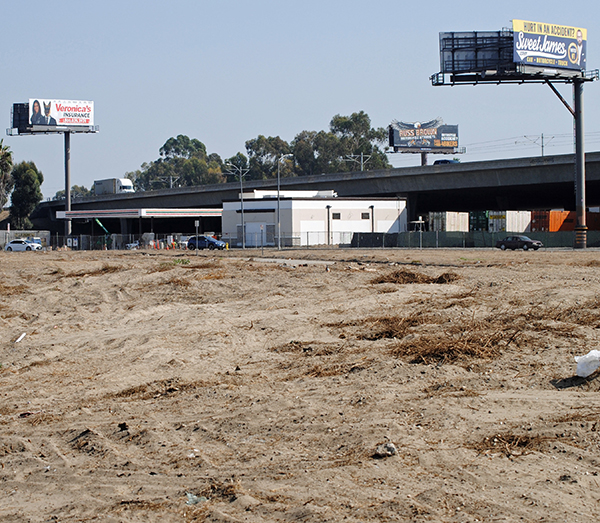By Alfredo Santana
Contributing Writer
LYNWOOD — The city has hired an engineering and environmental consultant for nearly $427,000 to prepare a soil pollution study from three tainted parcels for the state Department of Toxic Substances Control that, if approved, would clear the way for a potential cleanup to build affordable housing and commercial units.
The City Council issued a contract to Ramboll America Inc. to collect soil samples and document what hazardous substances lay in the soil of an industrial yard commonly known as the Alameda Triangle.
Composed of two strips of land split by a paved road closed to the public, the three city parcels abut Alameda Street to the west, Fernwood Avenue to the north and Imperial Highway to the south.
The unanimous vote was recorded without public discussion from the council members on Oct. 4.
Funds to pay Ramboll came from two state grants to investigate pollution on vacant parcels found in urban cores and underserved communities feared to be contaminated with harmful chemicals that may cause liabilities to owners and developers if not detoxified properly.
The money was awarded in June, and came on two separate allocations in addition to the nearly $5 million granted to remove soil and structures from another site on Long Beach Boulevard near the Glen Anderson (105) Freeway.
Ramboll, a company founded in Denmark in 1945, was hired to evaluate whether contaminants have reached groundwater, and to what degree business activities polluted the soil with polychlorinated biphenyls (PCBs), and other chemicals that may emit toxic vapors.
The grants to conduct environmental investigations are worth $242,000 and $184,000, respectively. Both were funded under the program called Equitable Communities Revitalization grant.
According to documents Ramboll submitted to Community Development Director Gabriel Linares on Sept. 13, the three lots will be tested for chemicals and substances that pose health hazards to humans.
The Alameda Triangle lots are located in the same block where several auto dismantling businesses and body shops currently operate.
Ramboll indicated that two PCB cleanups are being conducted in properties neighboring the empty city lots. One is at Mec Auto Dismantling Inc., property of Edvin Tavanian, and the other is at a state Department of Transportation yard.
“The low concentrations of PCBs in the soil will need to be discussed with [state officials] and the U.S. [Environmental Protection Agency] as to whether U.S EPA will require further delineation or a specific oversight application” in light of the two ongoing cleanups, according to a letter signed by Ramboll’s principal Leo Rebelle.
Data from previous vapor samplings will be presented to the state agency, in addition to a supplemental site investigation work plan to mark “the contaminants of potential concern identified at the site,” the Ramboll document said.
In order to prepare the cleanup work plan, Ramboll said that a “specific human health risk assessment” may be needed to further evaluate data and the type of mitigation systems for the proposed housing and commercial buildings.
Cesar Diaz, an employee with neighboring body shop company J.D.S. Customs, said that two week ago he saw people picking up garbage two days in a row from the city properties.
Diaz, who has worked for J.D.S Customs five years, noted that the crews did not collect soil samples, but he was unable to tell if they were part of a city maintenance group or belonged to a contractor.
“They spent two days cleaning and took off,” said Diaz while taking a lunch break at his minivan. “It’s been six to seven months the lots had not been cleaned from trash.”
J.D.S. Customs is at the end of a gated dead end strip contiguous with the Alameda Triangle lots, and is separated by a wall from the Mec Auto yard.
The long strip of land running along Fernwood Avenue is covered with layers of soil that resemble dry loose sea sand and a crumbling one-story vacant building at the corner of Fernwood and Alameda Street tells pedestrians with a sign that oil company Plains West Coast Pipeline LLC conducted business there.
According to the Environmental Protection Agency, PCBs were domestically manufactured for commercial use from 1929 until they were banned in 1979.
They had applications insulating electrical, heat transfer and hydraulic equipment, and were used in transformers, paints, plastic, rubber products, lubricants and carbonless copy paper.
The man-made chemicals are known to cause cancer of various types, like malignant melanoma and lymphoma.
The three parcels qualified for funds under the Brownfields program, defined by the state Department of Toxic Substances Control as “properties that are contaminated, or thought to be contaminated and are underutilized due to perceived remediation cost and liability concerns.”
Lynwood first sought a remedy to the environmental hazards surrounding the Alameda Triangle in 2013, but lack of funds derailed the proposed soil investigations and a work plan was never completed.
But in 2021, the city, in collaboration with Ramboll and the Cox-Castle Law firm, started the successful process to apply for the brownfields grants.
If the testing is completed and approved by November, Lynwood will be in position to apply for a second round of similar grants for actual cleanups in late December or January 2023, Linares said in a report.
“The preparation of technical environmental documents for completion of the … response plan are critical for the proposed future development of affordable housing and commercial development of the city-controlled Alameda Triangle properties,” Linares said.












